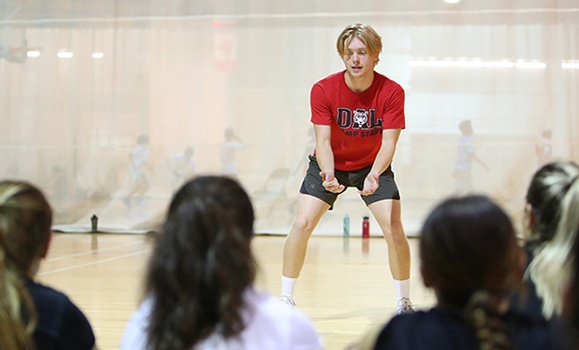National Coaches Week (Sept. 16-24) celebrates the positive impact coaches have on athletes and communities across Canada. Over the years, countless Tigers athletes have given back to their community through coaching.
Fourth-year jumper Tobi Oshikoya of the track and field team coached in his hometown of Truro, Nova Scotia, over the past two summers at École acadienne de Truro. As a jumps coach, Oshikoya coached children from grades 6-12.
“Charity begins at home,” is what Oshikoya’s father has always told him and continues to resonate with him.
“The community can only grow with help from the people within it,” says Oshikoya, who is in his fifth-year of engineering. “It starts from here. For coaching to build in our community, the athletes within it also have to give back by helping out and coaching no matter how small the level.”
A rewarding experience
Midfielder Charlotte Spencer of the women’s soccer team agrees with Oshikoya’s feelings on community building. The third-year midfielder coached both soccer and sailing in the past year.
“I think giving back to your community is extremely important. Obviously, when you're in a community, what you put into it is what you receive back,” says Spencer.
Taylor Heard, a striker on the women’s soccer team coached Dalhousie summer camps and Dunbrack soccer this summer, coaching children aged 8-13. Two girls from the Dalhousie camp attended the Tigers home opener on Sunday, where the Tigers defeated the Mount Allison University Mounties 5-0. Seeing the two girls cheer on the Tigers touched the Ottawa, Ontario, native's heart.
“It was really rewarding to feel like you're making a positive impact and to bring interest to women’s sports,” she says.
Two-time first team All-Canadian Lucy Glen-Carter of the women’s volleyball team was a sessional coach for team Nova Scotia’s U18 girls team this past summer. A master of physiotherapy student, Glen-Carter emphasizes it is not just the player's performance on the court that matters to her.
“I am really invested in making them good people, not just good volleyball players, which I think is probably the most important thing for the high development camps for younger athletes,” says Glen-Carter.
The Toronto, Ontario, native wants to stay involved in volleyball through coaching.
“I want to try to give as much back to volleyball as I can,” she adds.
Glen-Carter’s coaching experience has come full circle as she previously served as a sessional coach of Team Nova Scotia’s U18 girls team in the summer of 2019 that featured one of her current Tigers teammates - Alessandra Nadalini. While Glen-Carter said this makes her feel old, it also makes her proud.
“To win an AUS championship with her as a teammate last year means a lot because I've seen where she was and how far she's come and the person she's grown into,” she says.
Building community
The Tigers have helped bring a sense of community through sports. But the student-athletes have also been able to grow and develop as people and players through their time coaching.
Third-year men’s volleyball team player Luke Rideout coached in Halifax this past summer with Nova Scotia’s U18 boys team. Rideout, a White Rock, Nova Scotia, native helped lead them to the quarter-final of the Canada Cup this summer in St. Catharines, Ontario.
Coaching has opened Rideout to a different point of view as an athlete.
“I learned coaches want you to learn from your mistakes and not worry about making them. If you make mistakes but work hard to correct and learn from them, that’s all your coach truly wants,” says Rideout.
Rideout’s coaching experience has opened him up to new ideas. The recreation management major said he wants to pick up more information from players and coaches; the more knowledgeable he becomes, the more he can apply it to different situations.
“I understand that people are motivated in different ways to perform,” he adds. “A good coach will use different methods to motivate their athletes to encourage great team performances.”
Second-year women’s soccer player Olivia Jack’s experience with coaching has helped her adapt to and bond with teammates
“It helps with making sure your team is connected with one another and ensuring there is a leader on the team to make sure you're helping build the team while off the field as well,” says the science major who spent her summer coaching Suburban FC in Halifax.
Ella Hornby of the women’s volleyball team was a sessional coach this past summer for team Nova Scotia’s U16 girls, U16 boys, and U18 boys teams. Working with different groups and coaches, Hornby learned about coach's different styles and philosophies.
“My experience has taught me that I can become a better leader by becoming a better listener and observer in addition to being vocal on the court,” says the kinesiology major.
The Tigers look to continue to build upon the communities they have helped build through the student-athlete's passion for sports and community.
Be sure to follow us the next seven days for more features as we continue to celebrate National Coaches Week.

